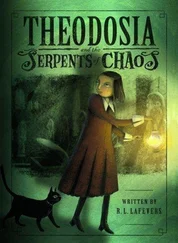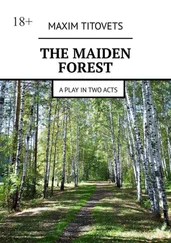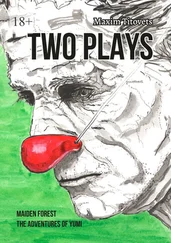“More like comatose.” Teo slid the papers out from under the King in Red’s head. His skull struck glass with a dull, dark sound. She fanned the pages, and froze. “Caleb. This is the Heartstone contract.”
“What? The original? The one that’s seventy thousand pages long and carved into stones from here to Alt Coulumb and back?”
“This is the signature page. The keystone. See, here. That’s his signature, and Alaxic’s, and the witnesses’. If this is destroyed, the contract starts to unravel.”
The King in Red must have woken early that morning, if he ever slept. Sipping his coffee, he felt Qet Sea-Lord die, felt the Serpents suck the marrow from his bones.
“He knew what was happening. And he tried to stop it.” Caleb laid Kopil on the floor beside the altar, arms crossed over his chest.
“This changes nothing,” Temoc said. He circled around the altar toward them. “We have no time. We must begin.”
“It changes everything. If we break this contract, the King in Red might wake up. RKC could break free of Heartstone. The board—”
“Their heathen Craft will be useless against the Serpents, as would your master’s if he wakes. Besides, he would see me, and try to kill me. We have no common cause.”
“You do now.” Caleb took the signature page from Teo, and held it up so his father could read the scrawled ink. “If he wakes up, he’ll see that you’re not part of Mal’s plot, that you’ve risked your life to stop her. You have a chance to make peace with him—to keep him from blaming this madness on every religious Quechal in the city.”
“What I have done today will change nothing in his eyes. We are old enemies, he and I.”
The picture in the silver frame stood on the desk, two men smiling, their eyes sepia-black. Caleb remembered Kopil’s voice: everyone thinks they’re on their own side, until the time comes to declare war.
“He might not like you, but he’ll fight beside you.” Caleb searched the desk, and found a letter opener, three pens, a coffee mug long since dry. Nothing that looked like it could dissolve contracts. “Teo, do you know how to break one of these things?”
“There’s usually a mess of protective Craft, but it looks like Kopil got rid of that already. Rip it. If that doesn’t work, try fire. Here, let me…”
“No,” Temoc said.
Teo’s shoes scraped against the floor, and Caleb looked up to see if she had tripped.
Temoc stood behind her, squeezing her throat in the crook of his elbow. Her eyes screamed. She clawed at his father’s arms, his hands, his face. Her mouth gaped for air. Her hat fell to the floor. She jerked her head back, but Temoc tightened his grip.
Her eyes rolled white, and drifted closed. Her body hung limp in his father’s arms.
Caleb leapt at Temoc.
His father turned faster than Caleb’s eye could follow. One fist swept around in a blurred half circle.
Darkness consumed the world.
Temoc looked down on his fallen son, and shook his head. He was a brave boy, to bear his father on his back, to grow to halting manhood with only a mother’s hand to guide him.
He was weak, but he lived in a time of weakness. The God Wars flayed the world and hung it on a cross. The strong fell and the craven thrived. No wonder Caleb’s generation retreated into despair and compromise. No wonder the children of the Wars drank and fornicated, gambled and danced and wondered, after long days smeared drunkenly into night, why their lives seemed meaningless.
An obsidian knife hung from Temoc’s belt. In seventy years he had used the blade twice. Ten years old, at his initiation into the priesthood, he carved the gods’ signs into his chest with hands blood-slick from the wounds his teachers gave him. The second time was the night the barricades rose in Skittersill; he knelt over his son and cut the same symbols into his flesh.
Temoc had never wondered about his purpose. His purpose was the point of that knife.
He lowered his son to the floor beside Teo, and turned to the King in Red. Kopil’s round skull glistened. Six decades before, peals of laughter had rung from that grinning mouth as he scattered the Quechal priesthood and broke their gods. He had impaled Temoc on a thorn of ice, and left him writhing to die.
Temoc set his foot on the skull and pressed down. The bone did not yield.
He stomped. Bone bounced against the floor, but did not chip or shatter. He roared and leapt on the skull with both feet, but it rang like iron and he stumbled back. The shadows of Kopil’s face mocked him.
Above, the moon broke the circle of the sun. Time enough for vengeance—later. He had a world to save.
Temoc lifted his son’s friend, the girl who had never known a man’s touch, the altar maid, the offering who confessed her willingness to die. He placed her on the altar.
He bowed his head, and drew his knife, and began to sing.
* * *
Mal and the moon opened their mouths and breathed in fire. The moon swelled and darkened as it consumed the sun’s body. Mal too devoured flame and was transformed.
Shadows fell upon the earth. She worked her Craft through the slumbering course of the Serpents’ minds. From deep dreams they whispered to her. They knew her name. The eclipse came, and the stars called them to battle.
“Come,” she whispered, taking hold of the Serpents’ reins. “This is your moment. Rise, and be my weapons.”
The earth trembled. Buildings shivered, pyramids shook. Another tremor came, stronger than the first.
Wake, she willed. The sun dies. Stars circle like starving vultures, and sup on the light that bleeds from its husk. As it dims they shine.
Come forth.
A stillness passed over the surface of the earth. Mal’s eyes snapped open.
Beneath the world’s shell, the Serpents stirred, and stretched, and woke.
* * *
Balam laughed at the first earthquake. Other protesters screamed, farther back in the crowd on Sansilva Boulevard before the Canter’s Shell: newcomers to the city’s struggles. The masters and Wardens of Dresediel Lex used their power to cow resistance. They shook the ground and burned the sky to spread fear, but they rarely killed. Hardened protesters trembled only at Couatl claws and lightning. Or they feared nothing, for Craftwork weapons moved faster than human eyes could follow or human ears detect, and to fear those was to live in fear.
Balam did not fear. Decades of cliff running and riots had burned the emotion from him.
And if this was no plan of the Wardens’, and the ground was trembling of its own accord, well, then, Dresediel Lex was a city on the ocean’s edge, and sometimes the earth shook beneath its weight. The crowd surged against him, acres of sweaty skin, stinking of meat and leather and rage.
“Is that the best you can do?” he shouted at the sky, at the pyramid sheltered behind its shield.
When the second earthquake came, he did not laugh.
* * *
Bedrock and packed earth did not stay the Serpents. Slithering upward they carved tunnels that caved in as they passed. The land rolled. Glass broke in skyscraper windows. Towers swayed and bowed their heads. Only the pyramids stood strong: they were built to outlast the world.
Sansilva bisected Dresediel Lex from east to west. Foreign visitors often wondered why the ancient Quechal had built so broad a road through the center of their city. Little freight passed through Sansilva, and few commuters—the priests had lived on their temple grounds.
They wondered on a false premise. The road had not been built for human use.
* * *
The second quake began like the first, shaking pitching ground, men and women crying out in alarm and pain, but rather than receding it built. Balam and his comrades stumbled against one another. They thrashed and pitched like froth, and this too was normal—but over their cries Balam heard another note, a high creaking cascade, everywhere at once, scraping against the pate of his skull.
Читать дальше











